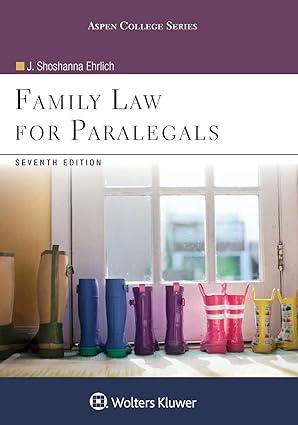This appeal presents the question whether adopted persons upon reaching adulthood (adult adoptees) are constitutionally entitled, irrespective
Question:
This appeal presents the question whether adopted persons upon reaching adulthood ("adult adoptees") are constitutionally entitled, irrespective of a showing of cause, to obtain their sealed adoption records, including the names of their natural parents. Appellants are adult adoptees and an association of such persons; and they urge that the New York statutes that require the sealing of adoption records are...invalid on Fourteenth Amendment Due Process and Equal Protection grounds and on further basis that those statutes impose upon them badges or incidents of slavery in violation of the Thirteenth Amendment. The ... District Court . . dismissed appellants' complaint. We affirm. Appellants argue that adult adoptees should be given access to the records of their adoptions with no showing of cause whatsoever. Their supporting affidavits ... indicate that lack of access to such records causes some of them serious psychological trauma and pain and suffering, may cause in them or their children medical problems or misdiagnoses for lack of history, may create in some persons a consciousness of danger of unwitting incest, and in others a "crisis" of religious identity or what they feel is an impairment of religious freedom because they are unable to be reared in the religion of their natural parents. The attack upon the New York statutes is three-fold. Appellants first argue that the interests of an adult adoptee in learning from the State (or from agencies acting under compulsion of state law) the identity of his natural family is a fundamental right under the Due Process clause of the Fourteenth Amendment. Second, appellants argue that adult adoptees constitute a suspect or "quasi-suspect" classification under the Equal Protection clause of the Fourteenth Amendment. Under this view semi-strict or intermediate scrutiny of the New York statutes would be appropriate, and appellants maintain that such a review does not indicate that the statutes are based on sufficiently important state interests....
Questions:
1. What statute did the plaintiffs challenge in this case? What harms did the plaintiffs say were caused by this law? What were they seeking?
2. What constitutional arguments did the plaintiffs make in challenging this statute?
3. How did the court respond to each one of the constitutional arguments? What themes run through the court's analysis? What competing interests does the court identify? How does the court balance these considerations?
4. In cases involving important policy issues, courts sometimes suggest possible legislative alternatives. Do you think it would be possible to craft a law that strikes a different balance between the competing interests, or do you think the balance struck by the New York law is the appropriate one?
Step by Step Answer:






